The Six Most Ridiculous Rules in the Comics Code
PUT ON YOUR LEARNIN' CAPS, it's time for a history lesson. Take a look at this guy:
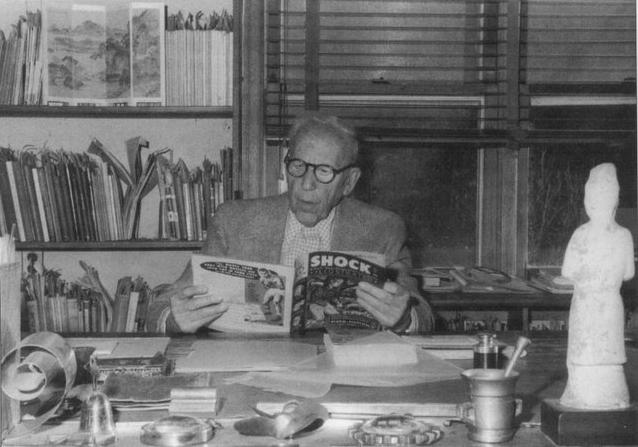
That's Dr. Fredric Wertham
, psychiatrist, who in 1954 wrote a book called
Seduction of the Innocent. In it, he blamed comic books for destroying the youth of America and corroding the very moral foundation of our society. To make his point he used the solid, scientific methods of conjecture, undocumented anecdotes from kids, and some -- admittedly -- brutal covers.
[caption id="" align="aligncenter" width="427"]
 O-oh this? No, no... these hooded men found her like this... she had been lost in the woods for days... yeah... lost...
O-oh this? No, no... these hooded men found her like this... she had been lost in the woods for days... yeah... lost...[/caption]
And you know what? It worked. Mobs of angry parents, authority figures, and people who just
knew there was something wrong with these gotdang kids today rallied against this "ten cent plague" that was taking sweet, innocent youths and turning them into criminals or, worse yet,
jazz musicians.
It got so heated, in fact, Wertham was called before the Senate Subcommittee on Juvenile Delinquency as an expert witness in the matter. There, he simply reiterated all the greatest hits of his book, including such pearls of wisdom as Superman being both un-American and fascist (two things Superman is the
exact opposite of), Batman and Robin actually acting as a homosexual fantasy between a man and a boy, and Wonder Woman giving little girls
"the wrong idea" about a woman's place in society (followed by the accusation that Wonder Woman's
strength and independence made her a lesbian).
Now to be fair, Golden Age comics didn't mess around. Batman would kill people, Superman would throw a guy into a wall for beating a lady with a belt, and publishers put out super gory horror comics with lots of dark story elements. However, this wasn't because they wanted to corrupt the youth, there was actually a pretty good reason...
[caption id="" align="aligncenter" width="581"]
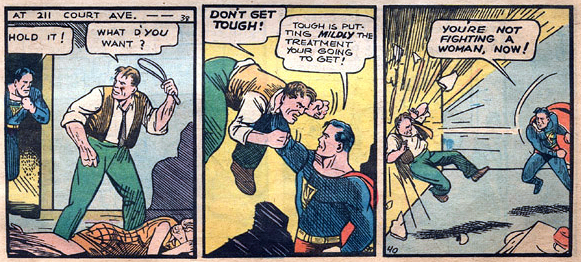 DID YOU THINK I WAS JOKING?
DID YOU THINK I WAS JOKING?[/caption]
A big chunk of their readers were adults. Weird right? You'd think that if there was ever a time when comics were meant most for kids, it would be the 50s. Not so. You see, there was this little skirmish overseas called World War II that called a lot of guys -- usually pretty young, fresh-faced guys -- over to fight. Over there, one of the few things from back home they were able to get their hands on were comic books. This made them pretty popular amongst the troops. When they got back, a lot of them continued to read comics, but wanted darker, more adult content. So publishers merely satiated that demand and guess what? It worked. For instance, Timely Comics (who would later become Marvel Comics) made a bulk of their profit off of crime stories -- not a superhero to be found.
But sadly Wertham won out in the end. To stem the tide of outraged parents, The Comics Code Authority was created to act as a self-governing body meant to pound comics into brutal political correctness. So ended the Golden Age of comics and thus began the all-smiles, Comics Code approved Silver Age.
Batwoman joined Batman and Robin on adventures into space, Superman had to be kind of a dick because he couldn't punch criminals into the stratosphere, and Wonder Woman stopped being so selfish and had, like, 13 kids (I might be a bit off on that last one). As another side effect, most of the adult readers lost interest, relegating comics to safe, meaningless kiddie fare. Something the medium wouldn't come back from for another couple of decades.
[caption id="" align="aligncenter" width="420"]
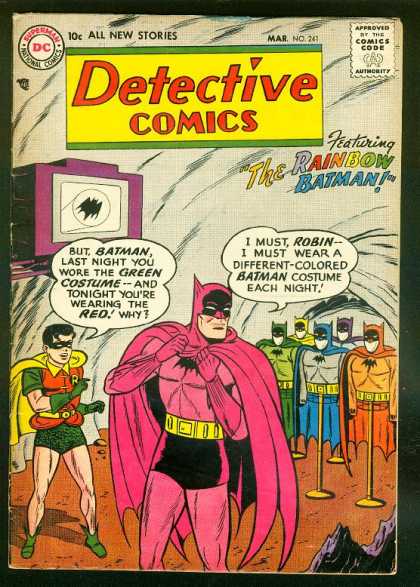 "Good thing we fixed the gay thing."
"Good thing we fixed the gay thing."[/caption]
So the CCA's job was to enforce
the Comics Code, a list of rules that comic book stories had to follow in order to get the "Approved By" stamp on the cover (check out the little stamp on the upper right corner of the cover above). Some of the rules made sense, like "hey don't show rape", and "lets tone down the amount of beheadings on the cover, you guys" (I'm paraphrasing). However there were some rules that were grade-A weaponized bonkers. Let's take a look.
6. General Standards Part A, Number 1:
"Crimes shall never be presented in such a way as to create sympathy for the criminal, to promote distrust of the forces of law and justice, or to inspire others with a desire to imitate criminals."
I suppose I could understand the part about not inspiring others to be criminals. If you made a comic today where the central theme was basically "Hey, you should try some armed robbery sometime, it's great!" it'd still be a pretty big no-no.
But a rule against making a sympathetic villain? Really? I mean, look, not
every villain has to be sympathetic. The Joker, for instance, is just evil. There's not a tragic past or motivation that defines him, he's just a monster. That's not a bad lesson. Sometimes people do terrible things because they're terrible people. There are monsters out there and they look just like us.
However, forcing comics to portray ALL criminals as dimensionless greedbots only robs the stories of their depth. Mr. Freeze was a goofy Silver Age villain that no one liked until
Batman: The Animated Series made him a tragic, sympathetic villain that everyone loved. Plus, you could've used it to your advantage, showing a sympathetic criminal repent his ways, renounce crime, and turn over a new leaf.
[caption id="attachment_46882" align="aligncenter" width="570"]
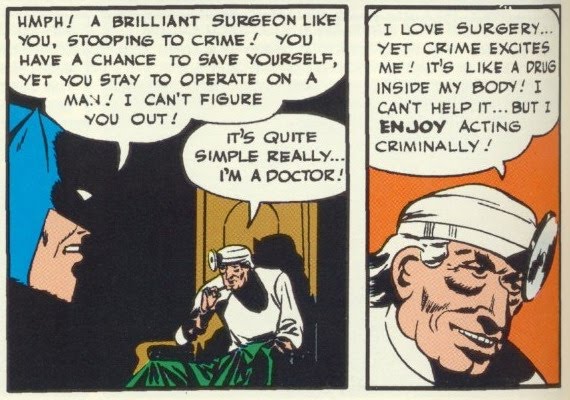 Wait, doesn't that make him a little sympathetic?
Wait, doesn't that make him a little sympathetic?[/caption]
What's worse, I think, is that it kind of goes against their goal. If you want to have nice, good-natured kids you need to teach them about empathy. Teaching them that all criminals are helplessly compelled to do terrible things tells them that there's not a person inside there. Criminals are just subhuman crime monsters, no need to think about the situation at all. Best to just have cops and Batmen shoot them on site. Easier. Cleaner.
5. General Standards Part B, Number 1:
"No comics magazine shall use the word horror or terror in its title."
Terror! Horror! In the 50s these words were so powerful that they would drive children into bloodthirsty madness by
merely reading them.
[caption id="" align="aligncenter" width="295"]
 As opposed to Normal Terror
As opposed to Normal Terror[/caption]
This is the worst kind of censorship. Instead of pointing out that something exists, but not talking about it, we're going to just ignore its existence completely. It's simple! We'll just shield these kids from the horror genre forever
and god help them if they go looking for it on their own.
This rule nearly destroyed the horror comic genre by itself, but it needed some help from another...
4. General Standards Part B, Number 5:
"Scenes dealing with, or instruments associated with walking dead, torture, vampires and vampirism, ghouls, cannibalism and werewolfism are prohibited."
You see, horror comics were a big sticking point with this moral comics movement, who dealt chiefly in the things that were "damaging" to kids. What's an easier target than the things that give kids nightmares, right? Because THAT'S what was making kids bad. The vampires. Good thing Wertham didn't live to see the
Twilight epidemic.
The worst part was that the rule was later half taken back in 1971, with a revision reading:
"Scenes dealing with, or instruments associated with walking dead, or torture, shall not be used. Vampires, ghouls and werewolves shall be permitted to be used when handled in the classic tradition such as Frankenstein, Dracula, and other high calibre literary works written by Edgar Allen Poe, Saki, Conan Doyle and other respected authors whose works are read in schools around the world."
This is why Dracula -- the actual character of Dracula -- is always fighting characters in both Marvel and DC.
[caption id="" align="aligncenter" width="424"]
 For example, here are the X-Men punching Dracula right in his vaguely European mouth
For example, here are the X-Men punching Dracula right in his vaguely European mouth[/caption]
Zombies were strictly forbidden because, unlike vampires and wolf mans, they didn't have a literary counterpart. However, because Stan Lee hated the Code more than someone else taking credit for something, Marvel went ahead and made
Zevumbies. A creature that is pretty much a zombie, just not... you know... called that.
Also why is torture and cannibalism lumped in with vampires, werewolves, and ghouls? They know torture and cannibalism exists, right?
Oh no, did the Code authors think monsters were real? NO
WONDER they were so upset! If that shit was real, that'd be no laughing matter!
3. General Standards Part A, Number 8:
"No unique or unusual methods of concealing weapons shall be shown."
Wait, what? Why is this a thing? Were they worried kids would start concealing weapons? It can't be, the rule isn't "no methods of concealing weapons shall be shown", just no
unique or unusual methods. Were they worried kids would start concealing their weapons
better? Hey how about you fix your kids having concealable weapons in the first place, the 50s!
HOLD ON, how does The Penguin exist then? His uses umbrellas to conceal more weapons than a Latin King in South Side Los Angeles. Is hiding a machine gun in an umbrella not unusual?
[caption id="" align="aligncenter" width="500"]
 Everything seems above board here
Everything seems above board here[/caption]
2. Marriage and Sex, Number 1:
"Divorce shall not be treated humorously nor represented as desirable."
I'd guess this is probably preventative, but was this a thing? Were there a lot of comics that thought divorce was a laugh riot? I don't remember titles like "Tales of Annulment" and "Weird Divorce". It's also
number one under Marriage and Sex, above "hey, c'mon guys, don't show sex", so it was right at the forefront of their minds. Maybe the guy in charge of writing this was going through a rough patch.
This also might explain why Superman didn't get married for half a century. Once you get locked in,
you get locked in forever.
1. General Standards Part A, Number 6:
"In every instance good shall triumph over evil and the criminal punished for his misdeeds."
Now I consider myself a pretty optimistic person. I like to think there's a lot of good in the world. I also think characters like Superman exist to show us that there
is good out there in all of us. We're all super.
But good doesn't win every time. That's what gives good meaning. If good
always won out, it'd be easy to be good. What use are good guys if they constantly beat one dimension evil-for-the-sake-of-evil bad guys just because they're on the moral high ground? That's not inspiring. That's not a
lesson.
[caption id="" align="aligncenter" width="349"]
 WHO WINS NOW, CODE? WWWHHHHOOOO?!
WHO WINS NOW, CODE? WWWHHHHOOOO?![/caption]
This rule, I think more so than the others, represents what was wrong with this Code. If you want to save kids from being brainwashed by certain messages, don't just brainwash them with your own message. You're not helping the nation's youth by selling them a fake status quo. Telling stories where vampires exist might actually be
less damaging in the long run compared to stories where good guys win all the time no matter what always. Because that's a lie.
Sometimes the bad guys win, sometimes the good guys save the day, but at too great a cost. Sometimes life just kicks you in the dick (or lady dick, this is the 21st century). However, it's in that moment where the best characters stand tall, dig in, and move on.
That's the lesson. That's what these character can teach. You're not a hero if you never have to face a loss. You're a hero if you can take a loss and find the courage to keep going.
The Good News
Over the years, the power of the Code faded. Stan Lee wanted to run a story featuring Harry Osbourne's pill addiction, but the Code wouldn't allow it, stating that no reference to drug use could be shown. Lee argued that he wasn't showing it
favorably, in fact just the opposite, but the Code denied him again. So Marvel ran the story anyway, sans Approved By stamp, and guess what? Nothing happened. No one cared.
After that, comics started getting away with more and more, until finally they stopped submitting to the CCA at all. Even
Archie stopped submitting to them, and they're so squeaky clean the worst swear ever said by a character was "thank you".
[caption id="attachment_46903" align="aligncenter" width="602"]
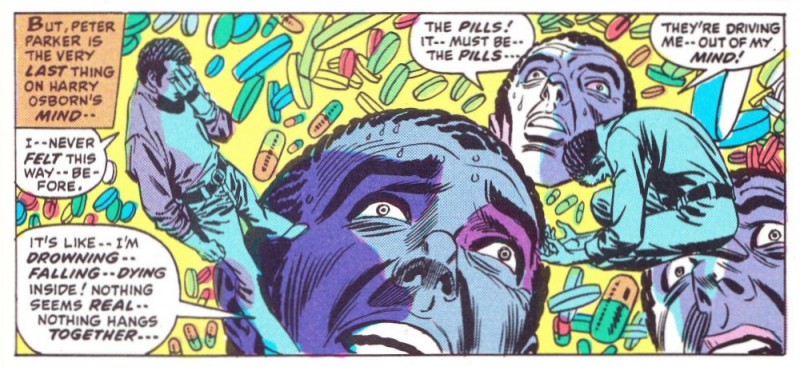 Good work, ya junkie!
Good work, ya junkie![/caption]
Now, pretty much everyone ignores the Comics Code. It is a relic of the past, a weird leftover of an overreactive time.
It's also worth noting that morally outraged mobs have also stopped blaming things for the corruption of youth. Well except for TV. And Movies. And Rock and Roll. And Rap. And music videos. And celebrities. OH, and Video Games. And most of the Internet. And
texting.
 That's Dr. Fredric Wertham, psychiatrist, who in 1954 wrote a book called Seduction of the Innocent. In it, he blamed comic books for destroying the youth of America and corroding the very moral foundation of our society. To make his point he used the solid, scientific methods of conjecture, undocumented anecdotes from kids, and some -- admittedly -- brutal covers.
[caption id="" align="aligncenter" width="427"]
That's Dr. Fredric Wertham, psychiatrist, who in 1954 wrote a book called Seduction of the Innocent. In it, he blamed comic books for destroying the youth of America and corroding the very moral foundation of our society. To make his point he used the solid, scientific methods of conjecture, undocumented anecdotes from kids, and some -- admittedly -- brutal covers.
[caption id="" align="aligncenter" width="427"] O-oh this? No, no... these hooded men found her like this... she had been lost in the woods for days... yeah... lost...[/caption]
And you know what? It worked. Mobs of angry parents, authority figures, and people who just knew there was something wrong with these gotdang kids today rallied against this "ten cent plague" that was taking sweet, innocent youths and turning them into criminals or, worse yet, jazz musicians.
It got so heated, in fact, Wertham was called before the Senate Subcommittee on Juvenile Delinquency as an expert witness in the matter. There, he simply reiterated all the greatest hits of his book, including such pearls of wisdom as Superman being both un-American and fascist (two things Superman is the exact opposite of), Batman and Robin actually acting as a homosexual fantasy between a man and a boy, and Wonder Woman giving little girls "the wrong idea" about a woman's place in society (followed by the accusation that Wonder Woman's strength and independence made her a lesbian).
Now to be fair, Golden Age comics didn't mess around. Batman would kill people, Superman would throw a guy into a wall for beating a lady with a belt, and publishers put out super gory horror comics with lots of dark story elements. However, this wasn't because they wanted to corrupt the youth, there was actually a pretty good reason...
[caption id="" align="aligncenter" width="581"]
O-oh this? No, no... these hooded men found her like this... she had been lost in the woods for days... yeah... lost...[/caption]
And you know what? It worked. Mobs of angry parents, authority figures, and people who just knew there was something wrong with these gotdang kids today rallied against this "ten cent plague" that was taking sweet, innocent youths and turning them into criminals or, worse yet, jazz musicians.
It got so heated, in fact, Wertham was called before the Senate Subcommittee on Juvenile Delinquency as an expert witness in the matter. There, he simply reiterated all the greatest hits of his book, including such pearls of wisdom as Superman being both un-American and fascist (two things Superman is the exact opposite of), Batman and Robin actually acting as a homosexual fantasy between a man and a boy, and Wonder Woman giving little girls "the wrong idea" about a woman's place in society (followed by the accusation that Wonder Woman's strength and independence made her a lesbian).
Now to be fair, Golden Age comics didn't mess around. Batman would kill people, Superman would throw a guy into a wall for beating a lady with a belt, and publishers put out super gory horror comics with lots of dark story elements. However, this wasn't because they wanted to corrupt the youth, there was actually a pretty good reason...
[caption id="" align="aligncenter" width="581"] DID YOU THINK I WAS JOKING?[/caption]
A big chunk of their readers were adults. Weird right? You'd think that if there was ever a time when comics were meant most for kids, it would be the 50s. Not so. You see, there was this little skirmish overseas called World War II that called a lot of guys -- usually pretty young, fresh-faced guys -- over to fight. Over there, one of the few things from back home they were able to get their hands on were comic books. This made them pretty popular amongst the troops. When they got back, a lot of them continued to read comics, but wanted darker, more adult content. So publishers merely satiated that demand and guess what? It worked. For instance, Timely Comics (who would later become Marvel Comics) made a bulk of their profit off of crime stories -- not a superhero to be found.
But sadly Wertham won out in the end. To stem the tide of outraged parents, The Comics Code Authority was created to act as a self-governing body meant to pound comics into brutal political correctness. So ended the Golden Age of comics and thus began the all-smiles, Comics Code approved Silver Age.
Batwoman joined Batman and Robin on adventures into space, Superman had to be kind of a dick because he couldn't punch criminals into the stratosphere, and Wonder Woman stopped being so selfish and had, like, 13 kids (I might be a bit off on that last one). As another side effect, most of the adult readers lost interest, relegating comics to safe, meaningless kiddie fare. Something the medium wouldn't come back from for another couple of decades.
[caption id="" align="aligncenter" width="420"]
DID YOU THINK I WAS JOKING?[/caption]
A big chunk of their readers were adults. Weird right? You'd think that if there was ever a time when comics were meant most for kids, it would be the 50s. Not so. You see, there was this little skirmish overseas called World War II that called a lot of guys -- usually pretty young, fresh-faced guys -- over to fight. Over there, one of the few things from back home they were able to get their hands on were comic books. This made them pretty popular amongst the troops. When they got back, a lot of them continued to read comics, but wanted darker, more adult content. So publishers merely satiated that demand and guess what? It worked. For instance, Timely Comics (who would later become Marvel Comics) made a bulk of their profit off of crime stories -- not a superhero to be found.
But sadly Wertham won out in the end. To stem the tide of outraged parents, The Comics Code Authority was created to act as a self-governing body meant to pound comics into brutal political correctness. So ended the Golden Age of comics and thus began the all-smiles, Comics Code approved Silver Age.
Batwoman joined Batman and Robin on adventures into space, Superman had to be kind of a dick because he couldn't punch criminals into the stratosphere, and Wonder Woman stopped being so selfish and had, like, 13 kids (I might be a bit off on that last one). As another side effect, most of the adult readers lost interest, relegating comics to safe, meaningless kiddie fare. Something the medium wouldn't come back from for another couple of decades.
[caption id="" align="aligncenter" width="420"] "Good thing we fixed the gay thing."[/caption]
So the CCA's job was to enforce the Comics Code, a list of rules that comic book stories had to follow in order to get the "Approved By" stamp on the cover (check out the little stamp on the upper right corner of the cover above). Some of the rules made sense, like "hey don't show rape", and "lets tone down the amount of beheadings on the cover, you guys" (I'm paraphrasing). However there were some rules that were grade-A weaponized bonkers. Let's take a look.
"Good thing we fixed the gay thing."[/caption]
So the CCA's job was to enforce the Comics Code, a list of rules that comic book stories had to follow in order to get the "Approved By" stamp on the cover (check out the little stamp on the upper right corner of the cover above). Some of the rules made sense, like "hey don't show rape", and "lets tone down the amount of beheadings on the cover, you guys" (I'm paraphrasing). However there were some rules that were grade-A weaponized bonkers. Let's take a look.
 Wait, doesn't that make him a little sympathetic?[/caption]
What's worse, I think, is that it kind of goes against their goal. If you want to have nice, good-natured kids you need to teach them about empathy. Teaching them that all criminals are helplessly compelled to do terrible things tells them that there's not a person inside there. Criminals are just subhuman crime monsters, no need to think about the situation at all. Best to just have cops and Batmen shoot them on site. Easier. Cleaner.
Wait, doesn't that make him a little sympathetic?[/caption]
What's worse, I think, is that it kind of goes against their goal. If you want to have nice, good-natured kids you need to teach them about empathy. Teaching them that all criminals are helplessly compelled to do terrible things tells them that there's not a person inside there. Criminals are just subhuman crime monsters, no need to think about the situation at all. Best to just have cops and Batmen shoot them on site. Easier. Cleaner.
 As opposed to Normal Terror[/caption]
This is the worst kind of censorship. Instead of pointing out that something exists, but not talking about it, we're going to just ignore its existence completely. It's simple! We'll just shield these kids from the horror genre forever and god help them if they go looking for it on their own.
This rule nearly destroyed the horror comic genre by itself, but it needed some help from another...
As opposed to Normal Terror[/caption]
This is the worst kind of censorship. Instead of pointing out that something exists, but not talking about it, we're going to just ignore its existence completely. It's simple! We'll just shield these kids from the horror genre forever and god help them if they go looking for it on their own.
This rule nearly destroyed the horror comic genre by itself, but it needed some help from another...
 For example, here are the X-Men punching Dracula right in his vaguely European mouth[/caption]
Zombies were strictly forbidden because, unlike vampires and wolf mans, they didn't have a literary counterpart. However, because Stan Lee hated the Code more than someone else taking credit for something, Marvel went ahead and made Zevumbies. A creature that is pretty much a zombie, just not... you know... called that.
Also why is torture and cannibalism lumped in with vampires, werewolves, and ghouls? They know torture and cannibalism exists, right? Oh no, did the Code authors think monsters were real? NO WONDER they were so upset! If that shit was real, that'd be no laughing matter!
For example, here are the X-Men punching Dracula right in his vaguely European mouth[/caption]
Zombies were strictly forbidden because, unlike vampires and wolf mans, they didn't have a literary counterpart. However, because Stan Lee hated the Code more than someone else taking credit for something, Marvel went ahead and made Zevumbies. A creature that is pretty much a zombie, just not... you know... called that.
Also why is torture and cannibalism lumped in with vampires, werewolves, and ghouls? They know torture and cannibalism exists, right? Oh no, did the Code authors think monsters were real? NO WONDER they were so upset! If that shit was real, that'd be no laughing matter!
 Everything seems above board here[/caption]
Everything seems above board here[/caption]
 WHO WINS NOW, CODE? WWWHHHHOOOO?![/caption]
This rule, I think more so than the others, represents what was wrong with this Code. If you want to save kids from being brainwashed by certain messages, don't just brainwash them with your own message. You're not helping the nation's youth by selling them a fake status quo. Telling stories where vampires exist might actually be less damaging in the long run compared to stories where good guys win all the time no matter what always. Because that's a lie.
Sometimes the bad guys win, sometimes the good guys save the day, but at too great a cost. Sometimes life just kicks you in the dick (or lady dick, this is the 21st century). However, it's in that moment where the best characters stand tall, dig in, and move on.
That's the lesson. That's what these character can teach. You're not a hero if you never have to face a loss. You're a hero if you can take a loss and find the courage to keep going.
WHO WINS NOW, CODE? WWWHHHHOOOO?![/caption]
This rule, I think more so than the others, represents what was wrong with this Code. If you want to save kids from being brainwashed by certain messages, don't just brainwash them with your own message. You're not helping the nation's youth by selling them a fake status quo. Telling stories where vampires exist might actually be less damaging in the long run compared to stories where good guys win all the time no matter what always. Because that's a lie.
Sometimes the bad guys win, sometimes the good guys save the day, but at too great a cost. Sometimes life just kicks you in the dick (or lady dick, this is the 21st century). However, it's in that moment where the best characters stand tall, dig in, and move on.
That's the lesson. That's what these character can teach. You're not a hero if you never have to face a loss. You're a hero if you can take a loss and find the courage to keep going.
 Good work, ya junkie![/caption]
Now, pretty much everyone ignores the Comics Code. It is a relic of the past, a weird leftover of an overreactive time.
It's also worth noting that morally outraged mobs have also stopped blaming things for the corruption of youth. Well except for TV. And Movies. And Rock and Roll. And Rap. And music videos. And celebrities. OH, and Video Games. And most of the Internet. And texting.
Good work, ya junkie![/caption]
Now, pretty much everyone ignores the Comics Code. It is a relic of the past, a weird leftover of an overreactive time.
It's also worth noting that morally outraged mobs have also stopped blaming things for the corruption of youth. Well except for TV. And Movies. And Rock and Roll. And Rap. And music videos. And celebrities. OH, and Video Games. And most of the Internet. And texting.